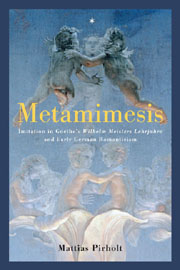
- Publisher:
- Boydell & Brewer
- Online publication date:
- February 2013
- Print publication year:
- 2012
- Online ISBN:
- 9781571138330
- Subjects:
- Literature, Area Studies, European Literature, European Studies
Our systems are now restored following recent technical disruption, and we’re working hard to catch up on publishing. We apologise for the inconvenience caused. Find out more: https://www.cambridge.org/universitypress/about-us/news-and-blogs/cambridge-university-press-publishing-update-following-technical-disruption

Mimesis, or the imitation of nature, is one of the most important concepts in eighteenth-century German literary aesthetics. As the century progressed, classical mimeticism came increasingly under attack, though it also held its position in the works of Goethe, Schiller, and Moritz. Much recent scholarship construes Early German Romanticism's refutation of mimeticism as its single distinguishing trait: the Romantics' conception of art as the very negation of the ideal of imitation. In this view, the Romantics saw art as production ('poiesis'): imaginative, musical, transcendent. Mattias Pirholt's book not only problematizes this view of Romanticism, but also shows that reflections on mimesis are foundational for the German Romantic novel, as is Goethe's great pre-Romantic novel 'Wilhelm Meister's Apprenticeship'. Among the novels examined are Friedrich Schlegel's 'Lucinde', shown to be transgressive in its use of the aesthetics of imitation; Novalis's 'Heinrich von Ofterdingen', interpreted as an attempt to construct the novel as a self-imitating world; and Clemens Brentano's 'Godwi', seen to signal the end of Early Romanticism, both fulfilling and ironically deconstructing the self-reflective mimeticism of the novels that came before it. Mattias Pirholt is a Research Fellow in the Department of Literature at Uppsala University, Sweden.
 Loading metrics...
Loading metrics...
* Views captured on Cambridge Core between #date#. This data will be updated every 24 hours.
Usage data cannot currently be displayed.